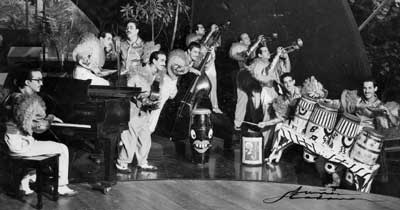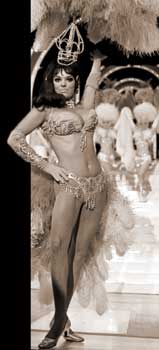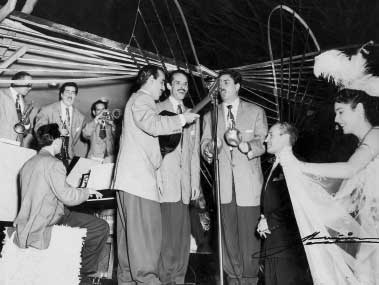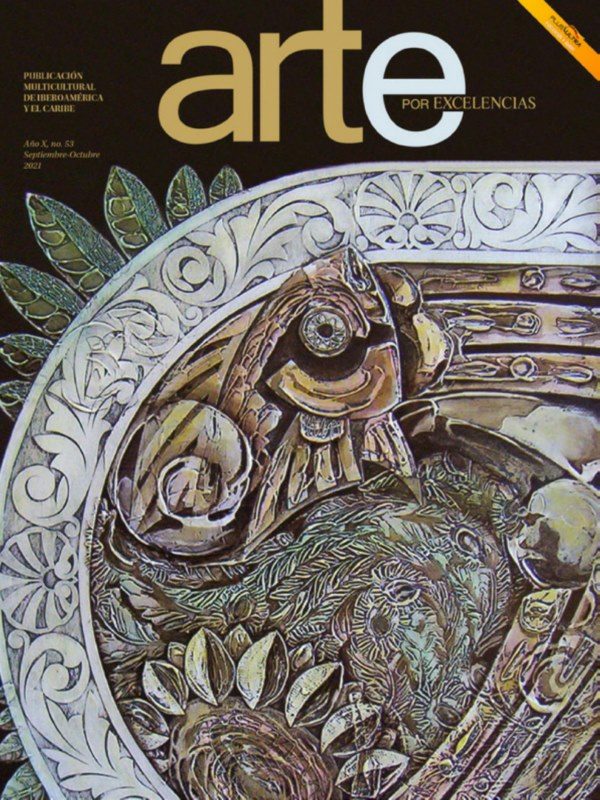 Despite the splendid shows offered, the business was not going well because of the economic crisis prevailing in the country and the distance between the cabaret and Havana at that time. Victor de Correa accepts Martin´s proposition and rents the upper floors of the building, in which he mounted a room specially prepared for his "traps". In the reception hall of the lower floors he placed a table to play baccarat.
Despite the splendid shows offered, the business was not going well because of the economic crisis prevailing in the country and the distance between the cabaret and Havana at that time. Victor de Correa accepts Martin´s proposition and rents the upper floors of the building, in which he mounted a room specially prepared for his "traps". In the reception hall of the lower floors he placed a table to play baccarat.
Given this perspective, Martin leased the showcase of Ciego de Avila, brought Echemendía to work with him and hired Ardura to take care of everything related to the "legal" gambling. This lease provided Correa the opportunity to increase sales by consumption of the gambling hall and Martin to have a guaranteed catering service, which would benefit his business. Never before Martin or any of his partners -Ardura or Echemendía- sat at a table to play; they had their henchmen, working in games, who fully represented ytheir interests.
Time passed, and while Martin increased profits, Correa continued with poor clientele, which forced him to request some cash loans from Martin and credit guarantees with suppliers of goods to ensure the survival of the restaurant. In time the debts grew and Martin became a partner in the cabaret. Thus he obtained more freedom for his operations. He settled the contract with Makarov, he bought the property in Villa Mina and began operating with the ball at the top of the cabaret.
A cafe that existed in the old garage of the residence, which was operated by some Spaniards, also became his domain. After making some adjustments and baptized it as El Dorado domino tables were set for the entertainment of drivers, customers and the general public.
 The triumph of Grau San Martin in 1944 and slogans against vice and corruption dealt a serious blow to Martin, who had to close the casino and everything related to the gambling. He dismisses all staff except his henchmen and continues as a member of Correa in the cabaret. The traps begin again, although with much discretion and in various houses rented for that purpose. They were very tough years for the economy, but Martin had reserves to face them, hoping that would not last long.
The triumph of Grau San Martin in 1944 and slogans against vice and corruption dealt a serious blow to Martin, who had to close the casino and everything related to the gambling. He dismisses all staff except his henchmen and continues as a member of Correa in the cabaret. The traps begin again, although with much discretion and in various houses rented for that purpose. They were very tough years for the economy, but Martin had reserves to face them, hoping that would not last long.
With the government of Carlos Prio, tolerance begins again. A Tourism Law to "protect" this important economic sector of the country, and Tropicana reopens the doors of the casino, this time under total control of Martin, the peasant of Ciego. This government decision spawned the known gangster bands that ravaged the country, among which were the Tigers, whose appearance at the cabaret tried to target it with their blackmail. Martin quickly sought protection from their partners of the high governmental sphere and these visits were eliminated.
The number of visitors to the cabaret remained very low and it was unaffordable, but Martin saw his gambling business flourish and did not allow the quality of the shows being downgraded. In a time of crisis he requires Correa to sell him his part or buy from him his. He refused and Martin brings together the leading suppliers of goods, which had been secured, and informs them, that from that moment on Correa would act at his own risk. The flow of supplies immediately stopped.
Correa's situation was desperate: no money and he can not find financiers. The day came when there were no goods available, and before losing it all he decides to sell Martin his part, which through blackmail becomes sole owner of Tropicana and begins to develop plans that were more like dreams.
Martin sends for his brother Peter, who worked in the cafeteria at Central Station in New York, and responsible with everything related to this branch. Ardura assumes part of the game and the shows and Echemendía remains as general manager of the cabaret and everything related to illegal gambling.
 These four characters would be the struts that would legally operate the cabaret. Martin controlled the entire business and divided the profits with his partners according to their responsibilities and seniority. After Martin were Echemendía and Ardura, who from this time became known as "The Man in the White Suit" for his famous hundred denim suits. Finally, there was Pedro. The checks were handed out on December 23 or 24 each year.
These four characters would be the struts that would legally operate the cabaret. Martin controlled the entire business and divided the profits with his partners according to their responsibilities and seniority. After Martin were Echemendía and Ardura, who from this time became known as "The Man in the White Suit" for his famous hundred denim suits. Finally, there was Pedro. The checks were handed out on December 23 or 24 each year.










